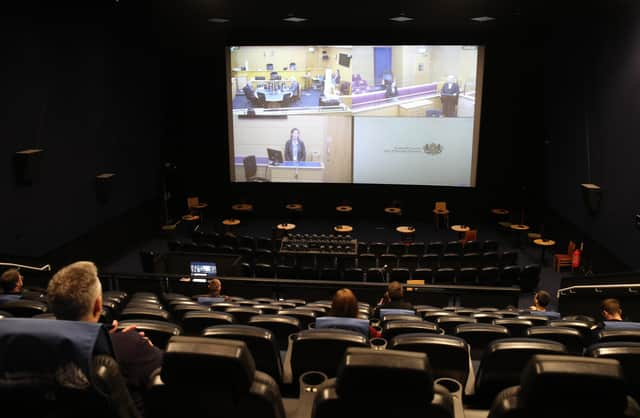Lawyers call for Covid changes to Scottish courts to become permanent


A number of measures were implemented to ensure justice could continue while Scotland operated under lockdown restrictions – such as remote jury trials in cinemas.
Now changes like the remote balloting of jurors, meaning only those who will actually sit need to attend court, as well as digital procedural hearings and e-signatures could become the norm.
Advertisement
Hide AdAdvertisement
Hide AdHowever, the lawyers also warned that some alterations have not worked as well – such as cross-examination by videolink – and should be dropped as soon as it is safe to do so.
Speaking in this month’s edition of 1919 Magazine, vice dean of the Faculty of Advocates, Ronnie Renucci QC, said that since the pandemic the only jurors required to attend in person were the 15 members and five reserves.
Previously, a significantly higher number would show up to court before being dismissed.
He said: “I would say that, for the benefit of the public, that has been much better.
“On the first day of a jury, people can go about their normal business, they can be at their work, they maybe get a phone call saying are you OK, you may get picked, we’ll phone you tomorrow.
“And then if they’re picked, the only inconvenience is them having to sit on the jury, not hang about the day before.”
However, Mr Renucci said that while digital trials have been a good temporary solution, they are not better than in-person hearings, at least in the High Court.
He said: “[With] the jury there, they’ll get a better feel for witnesses, they’ll get a better feel for the accused, they’ll be able to build up some form of connection, or not. You lose an awful lot doing it digitally.”
Advertisement
Hide AdAdvertisement
Hide AdIain Nicol, convener of the Law Society’s civil justice committee, said 90 per cent of its members believed digital procedural hearings should remain.
He added: “It’s a bit sterile, I think it’s fair to say, and certainly the art of advocacy is not enhanced by doing it digitally.”
The criminal trial backlog is now close to 50,000 as a result of the pandemic. New figures published last week by the Scottish Government as part of their monthly analysis into the impact of the pandemic on the justice system show the Scottish Courts and Tribunal Service has an estimated backlog of 48,993 trials.
In a bid to reduce the backlog, the Scottish Courts and Tribunals Service plans to introduce four more High Courts from September, as well as two more sheriff solemn courts and up to 10 summary courts.
A spokesman said: “The remote balloting of juries has been an integral part of our remote jury system. This is an area where we are considering how to incorporate the improvements in the longer term.”
The Scottish Civil Justice Council is shortly due to issue a consultation on how civil business will be conducted after the pandemic.
A message from the Editor:
Thank you for reading this article. We're more reliant on your support than ever as the shift in consumer habits brought about by Coronavirus impacts our advertisers.
If you haven't already, please consider supporting our trusted, fact-checked journalism by taking out a digital subscription.
Comments
Want to join the conversation? Please or to comment on this article.
